 Some hope to break the Israeli-Palestinian vicious circle emerged when it was announced about resumption of peace talks next week. Dr. Saeb Erekat, the Palestinian chief negotiator, will travel to Washington next week to meet Israeli Justice Minister Tzipi Livni, for what is supposed to be direct negotiations after five years of stagnation. Both representatives participated formal negotiations in 2008 when the final agreement almost was reached.
Some hope to break the Israeli-Palestinian vicious circle emerged when it was announced about resumption of peace talks next week. Dr. Saeb Erekat, the Palestinian chief negotiator, will travel to Washington next week to meet Israeli Justice Minister Tzipi Livni, for what is supposed to be direct negotiations after five years of stagnation. Both representatives participated formal negotiations in 2008 when the final agreement almost was reached.
New talks are possible due active and skilled shuttle diplomacy implemented by US Secretary of State John Kerry, who succeeded where both his predecessor Hillary Clinton and his superior, President Barack Obama, failed. However this is only start of the process and before fial status talks there is need to agree over the foundations of the negotiations themselves, how to start, how and when to finish. A lot of obstacles is waiting, for example involvement of Hamas and Gaza to negotiations. Also from its part European Union tries to sabotage negotiations with its groping foreign policy and its foolish directives.
Kerry’s shuttle diplomacy
For years the Palestinian Authority (PA) has refused to negotiate unless some preconditions are accepted. The main demands before peace talks have been that the border of the future Palestinian state would be along lines that existed before the 1967 Six-Day War and that Israel halts all construction in West Bank settlements. Israel has refused, saying negotiations should resume without conditions.
On his sixth trip to the Middle East in five months as America’s top diplomat, U.S. Secretary of State John Kerry, continued his effort to restart Israeli-Palestinian peace talks that floundered and collapsed in 2008. And on 19th July 2013 Kerry was able to announce that Israel and the Palestinians will meet end of July 2013 in Washington to finalize an agreement on relaunching peace negotiations for the first time in five years.
According to media reports, but not confirmed by Secretary Kerry, Israel has agreed a package of incentives for the Palestinians – including restraint in settlement building, the gradual release of prisoner serving long sentences for terror offenses, and economic projects in the West Bank – whilst the Palestinians are expected to suspend unilateral efforts to seek recognition in international bodies.
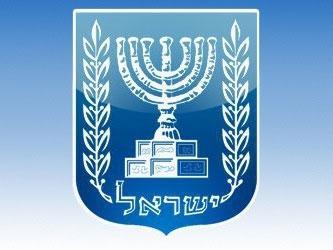
The carrots
Kerry has highlighted a 2002 offer by the 22-nation Arab League to make peace with Israel in return for a Palestinian state broadly inside borders that existed before Israel occupied the West Bank, Gaza Strip and East Jerusalem in 1967. At the 2002 Arab League Initiative, which proposed full Arab recognition of Israel in exchange for a series of conditions, including the return of Palestinian refugees to what is now Israel. However, in May this year, a high level Arab League delegation, after meeting with Kerry, agreed to change the language of the Arab Peace Initiative from its rigid demand for a Palestinian state on the 1967 lines to accepting “comparable,” mutually agreed and “minor” land swaps.
Related to settlements it has claimed that they kill the two-state solution but this from my perspective is not obstacle after the now revised Arab League Initiative. 80% of the settlers live in large blocs close to the Green Line. To connect those blocs up to Little Israel will require a land swap of about 6%. That is doable. This has been almost accepted in previous talks at Camp David and Annapolis as well in Olmert’s proposal at last final status negotiations 2008. While 20% of the settlers live outside these green line blocs, these settlements will not be part of Israel proper, after a proposed deal so some 20-30,000 households will have to be absorbed back into Israel and also this is doable.
Kerry has offered the Palestinians a package of economic incentives to restart the talks.According to the secret Kerry plan (not confirmed anywhere) as one of these concessions, Kerry wants Israel to permit the Palestinians to build in Jericho for their prospective state an international airport for direct civilian flights to and from America and Europe. Those flights would cross Israeli air space and be coordinated with Israeli flight control authorities. Kerry envisages the transformation of the entire Jericho region north of the Dead Sea and near the Jordanian border into a busy hub for galvanizing the economy of the future Palestinian state. He wants Israel to hand over to the Palestinians the Kalia region on the northern shore of the Dead Sea. Kibbutz Kalia, albeit part of sovereign Israel from its inception in 1948, is nonetheless one of the assets Kerry wants Israel to cede to the Palestinians. Israeli concessions would not end at the northern Dead Sea coast, according to the secret Kerry plan; it would be just the first in a series of land and sovereignty handovers granted the Palestinians in trilateral negotiations among Israel, the Palestinians and the United States. The Palestinians would also be awarded by the process a three-year economic reconstruction program for boosting their Gross National Product by 50 percent and slashing unemployment from 21 to 8 percent.
The Olmert proposal
“Reaching an agreement is possible; it is realistic, but you need to want it and you need to pray that the leadership will want it.” (Ehud Olmert)
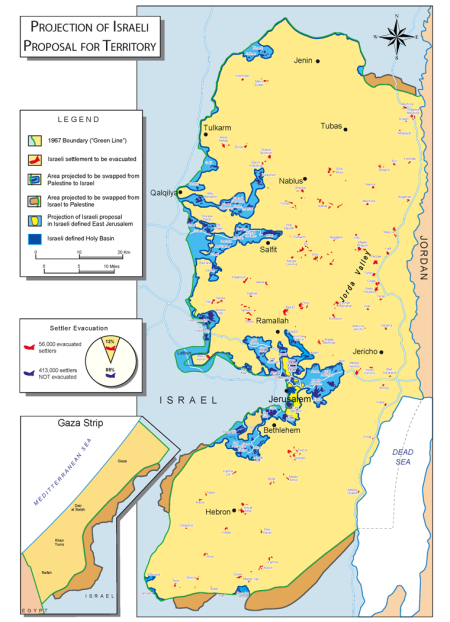
The last time Israelis and Palestinians conducted formal final status talks was under former Prime Minister Ehud Olmert. But his successor PM Netanyahu has formally rejected the proposals that Olmert made at the time to Palestinian President Mahmoud Abbas.
New negotiations are not starting from scratch, both Livni and Erekat have many times been looking the same almost agreed map according which Israel would annex 6.3% of the area of the West Bank, a move which would enable around 75% of the population of Jewish West Bank settlements to remain in their homes. In return for this, land would be transferred to the Palestinians equivalent to 5.8% of the area of the West Bank. In addition, a ‘safe passage’ route linking Hebron in the West Bank and the Gaza Strip would be established. Besides border issue also other core questions – such as future arrangements in Jerusalem and the refugee issue – were earlier almost solved. More about earlier negotiations in PaliLeaks, land swaps and desperate search of peace
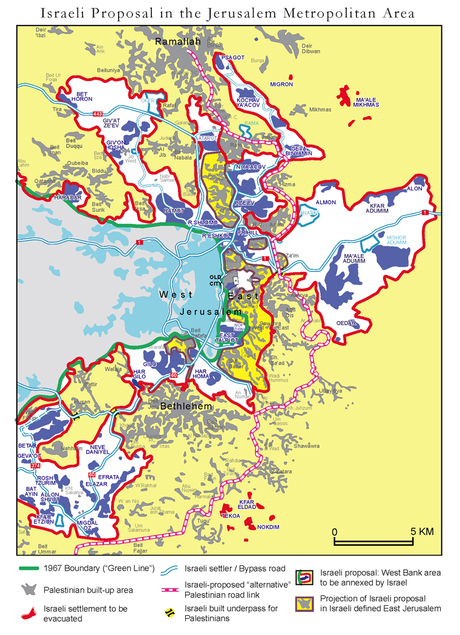
EU trying to sabotage peace negotiations
While U.S. has implemented their active shuttle diplomacy in the front line the EU’s rearguard are trying to put obstacles for peace process. Just when peace diplomacy on the ground was at crucial point the EU published its directive which mandates that “all agreements between the State of Israel and the EU must unequivocally and explicitly indicate their inapplicability to the territories occupied by Israel in 1967.” The EU explained that the goal of the directive was to draw a solid line between the state of Israel and the “occupied territories,” especially over issues that concern EU cooperation.
In Jerusalem, officials said that the EU directive essentially determines that – given the absence of an agreement signed between Israel and the Palestinians – 100 percent of the territory in Judea and Samaria belong de facto to the Palestinians.
Trade with the EU in 2012 amounted to $36.6 billion. Israel imported $22.4 billion worth of goods from the EU that same year. Also the Palestinians were not so pleased as the Arab side is also going to be harmed by this EU directive; Palestinian laborers are going to lose their livelihoods as a result of the decision to exclude settlement enterprises from future cooperative agreements. A generous portion of the labor in Judea and Samaria is Palestinian and for example many joint Israeli-Palestinian agricultural projects situated in West Bank are funded by members of the EU and now in danger.
According to a report in Ma’ariv, Israel has threatened to pull out of the EU’s massive science and technology project, “Horizon 2020″. Israel is the only non-European full partner in the project, and is supposed to invest 600 million Euro (785 million US dollars) in the project over 7 years. Besides the financial hit the EU project would take as a result, the move would be a serious blow to the project’s prestige and success. Israel is a central partner in the projects that Horizon 2020 undertakes, and part of these project’s successes are dependent on Israeli human resources and research.
EU wishing to be included in the peace process should change their directive for example expressing that the territories of east Jerusalem, Judea and Samaria and the Golan Heights are in dispute and their fate will be determined through direct negotiations.
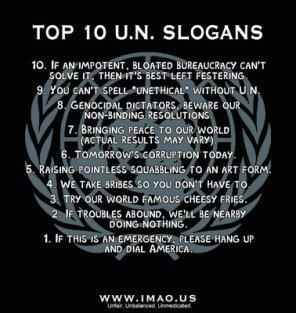
These principles might describe EU too?
Gaza question
In my opinion question about Gaza should be solved at early stage during coming negotiations. Gaza’s isolation was imposed originally to delegitimize and undermine Hamas’ leadership. Palestinian Authority or better say Fatah was hoping to produce positive economic development in the West Bank which could lead Gazans to overturn Hamas rule.The opposite came true as Hamas’ control grew tighter. Though Israel and Egypt allow limited imports into Gaza, the economy of Gaza largely relies on illicit trade that flourishes via an alternative “tunnel economy.” Hamas enriches itself at the expense of the Palestinian Authority (PA) by collecting tolls from tunnel operators and import taxes on goods brought into Gaza. This second economy increases ordinary Gazans’ reliance on Hamas rule, which most would prefer to see end. Making peace deal only between Israel and the PA does not solve the Israeli-Palestinian conflict and ignoring Gaza further incentivizes Hamas to oppose peace with Israel and any deal its Palestinian adversaries conclude.
A new reintegration strategy is needed instead of isolation, it should reconnect Gaza with the West Bank to lessen Hamas’ grip on Gaza. To be effective at least following components should be included to the new strategy for Gaza:
1) Economic component encouraging Israel and the PA to reestablish trade links with Gaza. Israel should expand the amount of trade allowed from its territory, and also reopen trade from the West Bank. Gazans should be allowed to open an export corridor through Israel. Allowing goods to flow between Gaza and the West Bank will change Gaza’s economy away from illicit trade with Egypt and strengthen the moderate middle class
2) Social component encouraging Israel and the PA to reestablish the suspended transit corridor for Palestinians to travel between the West Bank and Gaza.Allowing Gazans to visit the West Bank and vice versa will help restore the social bonds and build national consciousness required for statehood.prepare Palestinian institutions for elections and to empower PA for peace deal..
3) Political component preparing the PA for Palestinian national elections.The Palestinians have not held national elections since 2006, and governing institutions required for statehood are losing legitimacy as a result.
Implementation of this new approach could be made with help of international advisory group composed of those countries already friendly with Hamas (Turkey, Qatar, and Egypt), plus countries (Jordan, the United Arab Emirates, and Saudi Arabia) more likely to take into account the Fatah-dominated PA’s views. Sure this policy change poses risk, however the more certain danger is in perpetuating a status quo that benefits Hamas.
My conclusion
In Israel big part of population thinks that Israel as strong Jewish state can best defense their interests and hard line government to implement their wish. Palestinian leadership is defending rights of local Muslim population, refugees and vision of Palestine state. Hard line Palestine groups – with remarkable popular support – is implementing their vision with terrorist acts. In outside power centres especially in Anglo-Saxon world both Israeli and Palestinian interest groups are putting their pressure to western capitals. Many outsiders admit that both sides have good base for their claims.
Now I am more optimist than pessimist with this new round of talks. The status quo is too expensive situation both economically and politically for both Israel and Palestine. The deal would allow both parties to look forwards – the deal would release resources for economic development and for building capacities in society. There is also regional need to solve Israeli-Palestinian conflict as other more serious conflicts are spreading in the (Great) Middle East
If negotiations however again fail so from my perspective Israel could concentrate to talk solution with Egypt and Jordan. I have propagated long for “three-state” approach, where Gaza is returned to Egyptian control and the West Bank in some configuration reverts to Jordanian sovereignty. From my point of view this solution is both pragmatic and doable. (More in The Three-State Option could solve Gaza Conflict )
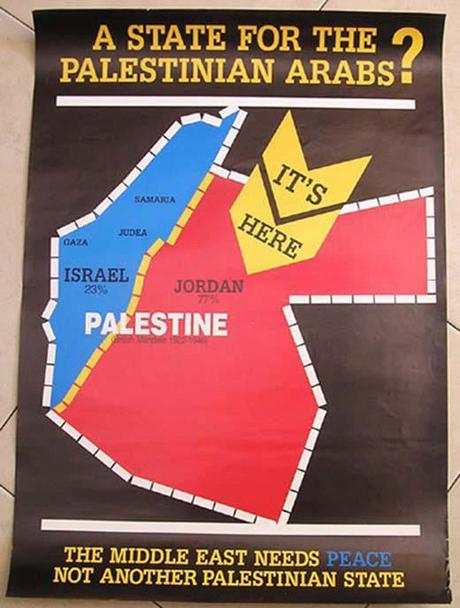
Some of my related articles:
- Will Obama Reset The Middle East Peace Process?
- A Jordanian-Palestinian Confederation Is On The Move
- PaliLeaks, land swaps and desperate search of peace
- Israeli Vs Palestine Refugees – In, Out and No Return
- Israeli-Palestinian Conflict – Negotiation Slot for a Month
- Fatah-Hamas Deal: Three Scenarios
- The Third Intifada – To Fade or Escalate
- Gaza War – Could Balkan history show way out?

